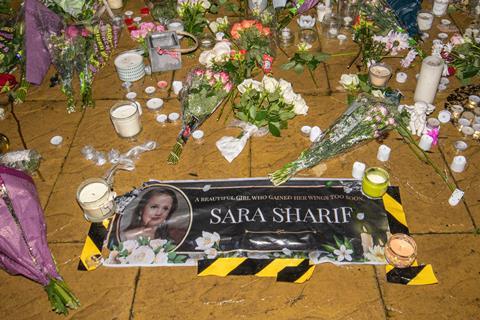An order made by a High Court judge to restrain the naming of judges who sat in proceedings concerning the late Sara Sharif, who was murdered by her father and stepmother, infringed upon the principle of open justice 'in a manner that is without any known precedent', the Court of Appeal heard today.
The appeal, before Master of the Rolls Sir Geoffrey Vos, Lady Justice King and Lord Justice Warby, centres on Mr Justice Williams’ order barring the public naming of three judges who heard family court proceedings in relation to the Sharif family. The appeal against the order began today in Court 4 of the Royal Courts of Justice.

Chris Barnes, for journalists Louise Tickle and Hannah Summers, described the order as ‘particularly exceptional’ and ‘unprecedented…in a situation where there was no procedural compliance’.
In written submissions, Barnes said: ‘The maintenance of such an order, with a wholly generalised and insufficient basis, represents a return to the comfort blanket of anonymity in which true accountability is lost. The judge’s order preventing the naming of those judges is unjustified, and undermines necessary efforts to increase transparency in the family justice system, it cannot be allowed to stand.’
The court heard that the judges involved in family court proceedings in relation to Sharif were identified in documents disclosed to the media before Mr Justice Wiliams’ order. Their names could thus have been reported before the order was made.
Barnes said the away the order was made 'amounts to exceptionally serious procedural error'. ‘The judge was making an exceptional order against the entire media', he said: 'Without notice, without reason, and that - in any division -amounts to serious exceptional procedural irregularity.’
He described as 'problematic' the analogy in the judge's reasons which said that to hold individual social workers or guardians or judges accountable is equivalent to holding the lookout on the Titanic responsible for its sinking.
Barnes told the court that the order ‘does reflect the continuing imperative to drive proper cultural change as to the role and place of the media [when covering court proceedings]’.
In written submissions, Jess Glass, of appellant PA Media, said Williams' judgment in relation to naming judges was ‘an extraordinary decision amounting to a substantial derogation of the open justice principle, is corrosive to public trust in the judiciary and wider family court system, and flies in the face of substantial efforts to increase trust and transparency’.
Adam Wolanski KC, for the first and third to ninth respondents, which include media organisations such as the BBC, said a judge’s Article 8 rights to privacy are ‘not engaged by the mere fact of publishing the fact they are sitting on a case’. He added: ‘[Williams] himself fails to grapple how things he said [in the judgment] may…engage with Article 8. [it is a] notable shortcoming.’
Wolanski told the court that in making the anonymity order the judge had fallen into the ‘trap’ of filling an editor’s shoes. ‘It is not for the judge to decide, because he thinks the judges have done nothing wrong, that they should not be identified.’
Cyrus Larizadeh KC, for Urfan Sharif, Sara Sharif’s father was last year sentenced to a minimum of 40 years in prison, told the court he opposes the appeal and the order should be upheld for the reasons given by Williams.
Larizadeh told the court the three judges had written of their ‘serious concerns about the risks that would arise if they were now identified’. He added: ‘Once you allow the genie out of the bottle, it is too late, and publication of the names would allow the genie out of the bottle before there has been any proper assessment of risk.’
The hearing, which is listed for two days, continues.
This article is now closed for comment.



























8 Readers' comments